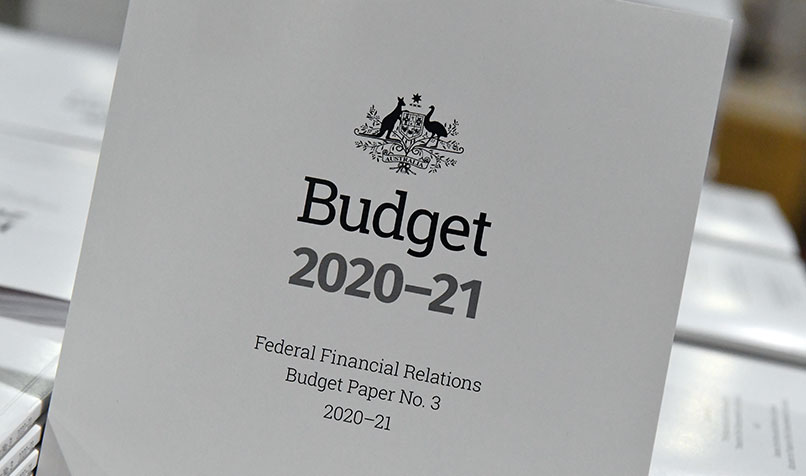9 October

2020/21 Federal Budget Highlights
The Federal Treasurer, Mr Josh Frydenberg, handed down the 2020/21 Federal Budget at 7:30 pm (AEDT) on 6 October 2020.
Australia’s economic response to the COVID-19 pandemic in the form of the original and extended JobKeeper scheme, the cashflow boosts and the enhanced JobSeeker payment has come at a significant cost, Mr Frydenberg said, resulting in a budget deficit of $213.7b, falling to $66.9b by 2023/24.
The government has proposed to bring forward by two years individual tax cuts legislated to start in 2022/23, meaning as of the 2020/21 income year the 19% threshold will be lifted from $37,000 to $45,000 and the 32.5% threshold lifted from $90,000 to $120,000. The low and middle income tax offset will also be retained for an additional year.
The Budget has been described as an economic recovery plan which is “all about jobs” — with the introduction of a new JobMaker Hiring Credit scheme designed to give businesses incentives to take on additional young people seeking jobs. In a major boost to business investment, immediate deductions for asset purchases of any value will be available to businesses with a turnover of up to $5b, until June 2022. Other measures include further refinement of proposed changes to the R&D incentive, FBT and CGT exemptions.
The Budget papers also list in an appendix, measures and policy decisions previously announced and published in the July 2020 Economic and Fiscal update.
The full Budget papers are available at www.budget.gov.au and the Treasury ministers’ media releases are available at ministers.treasury.gov.au.
The tax, superannuation and social security highlights are set out below.
Individuals
- Individual income tax cuts for the 19% and 32.5% tax brackets will be brought forward two years to 1 July 2020, as will an increase to the low income tax offset. Planned removal of the low and middle income tax offset has been scrapped for one year.
- A targeted capital gains tax exemption will apply for granny flat arrangements where there is a formal written agreement in place.
- Income tax exemptions for individuals working for the International Monetary Fund and the World Bank Group to be clarified.
Business incentives and companies
- Business with aggregated annual turnover of up to $5b will be able to deduct the full cost of eligible depreciable assets of any value in the year they are installed. The full expensing period is available from 7:30pm AEDT on 6 October 2020 to 30 June 2022.
- Small business depreciation pools may have up to 30 June 2022 to write-off their entire balances.
- Companies with turnover between $50m and $500m given additional six months to comply with instant asset write-off provisions.
- Businesses with turnover between $10m and $50m will have access to some existing small business tax concessions.
- The research and development (R&D) tax incentive is proposed to change from 1 July 2021. Small R&D entities to be entitled to an offset of 18.5 percentage points above their tax rate with no refundable limit. Large R&D entities will have intensity tiers reduced from three to two, with offsets of 8.5 and 16.5 percentage points above their tax rate.
- Eligible employers can claim a JobMaker Hiring Credit of up to $200 per week for each additional new job they create for an eligible employee from 7 October 2020 to 6 October 2021.
- The apprenticeship wage subsidy will be further expanded by JobMaker.
- Eligible companies with turnover up to $5b will be able to offset tax losses against prior year taxed profits to generate a refund.
- Companies that are incorporated offshore will be treated as Australian tax residents where there is a significant economic connection to Australia.
- Victorian business support grants will be made non-assessable, non-exempt income for tax purposes.
- Australia will increase funding to strengthen its foreign investment framework.
Other tax measures
- Employer-provided retraining and reskilling for redundant, or soon to be redundant, employees will be exempt from fringe benefits tax.
- Employers will be allowed to use existing corporate records, rather than prescribed records, to comply with their fringe benefits tax obligations.
- Seven more organisations have been approved as specifically listed deductible gift recipients.
- The list of jurisdictions that have an information sharing agreement with Australia will be updated.
- The import duty waiver for certain medical and hygiene products used against COVID-19 will be extended.
Superannuation
- Individuals will keep their existing superannuation fund when they change jobs. Employers will pay super to a new employee’s existing fund rather than creating a new account.
- An interactive online comparison tool will help individuals decide on the best superannuation product to meet their needs.
- From July 2021, APRA will conduct benchmarking tests on the net investment performance of MySuper products and prohibit underperforming products from receiving new members.
- Superannuation trustees will be required to comply with a new duty to act in the best financial interests of members.
Social security
- Two separate $250 economic support payments will be provided to eligible recipients. The first payment will be made from November 2020 and the second from early 2021. A one-off $1,500 pandemic leave payment will be made to eligible individuals who are unable to work and earn income while under a direction to self-isolate, quarantine or who are caring for someone who has tested positive to COVID-19.
- The independence test for Youth Allowance and ABSTUDY will be temporarily revised from 1 January 2021. Young people who are seeking to qualify as independent for the purposes of assessing Youth Allowance (student) and ABSTUDY payment eligibility will also be provided with incentives to participate in seasonal work in the agricultural industry. Veterans’ disability pensions will be exempt from the income test for Commonwealth Rent Assistance (CRA) and income support payments.
If you have any question on your business or require our assistance, please contact our office on (08)7120 2384 or support@tagaus.com.au.
